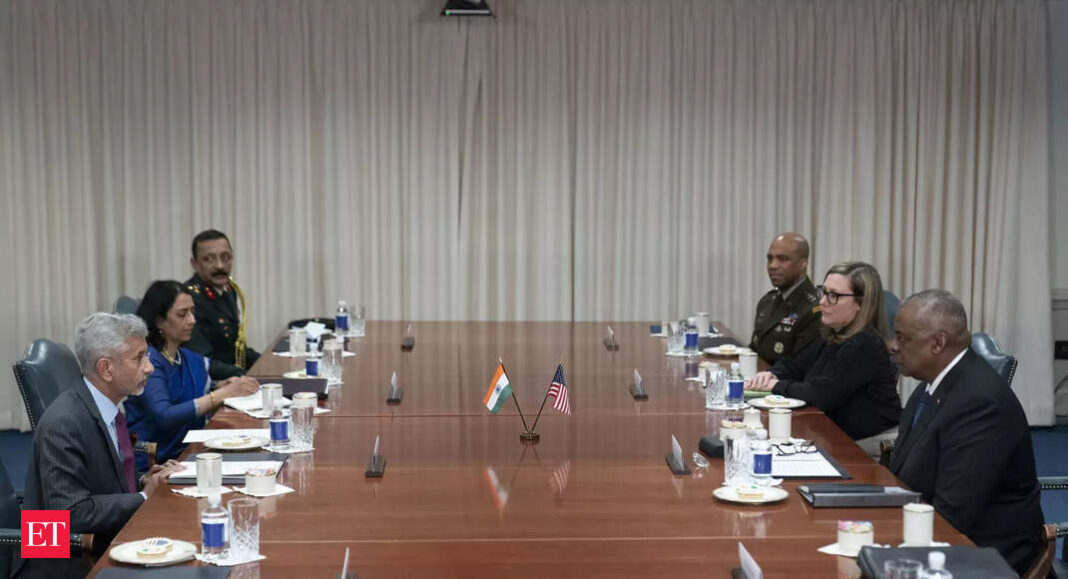India and the US will not be simply speaking on a regular basis about every part below the solar, however they’re additionally working collectively to ‘form the route of the world’, no much less. Bilateral relations are hale and hearty and rising throughout previous and new domains.
With few arguments and fewer disputes over coverage in South Asia, the one sore level is Pakistan. The US choice to present Pakistan $450 million to enhance its F-16 fleet so it might fly longer and higher in opposition to Indian defences clearly hasn’t gone down well. It’s each a safety and a political drawback for New Delhi.
Other than Pakistan, Joe Biden and his high officers have proven nice understanding of India’s dilemmas and difficulties. They have been useful within the present border stand-off with China by way of capabilities and intelligence-sharing. The Biden crew has been particularly understanding of India vis-a-vis Russia and the conflict in Ukraine. Now that India’s place has advanced, US officers cannot cease applauding. But the subsequent hurdle could possibly be India’s place on the faux Russian referenda.
In flip, India’s perspective on the grave challenges arising from the conflict for an unlimited variety of smaller, poorer and marginalised international locations has been essential for Washington. India is taking part in a ‘bridging’ function in a world that’s each ideologically polarised along many axes and overburdened by challenges of Covid, conflict, meals, oil shortages and local weather calamities.
S Jaishankar mentioned these urgent points over three days of ‘very strong, optimistic, productive bilateral conversations however framed within the context of bigger international challenges’. He hammered on the three Fs – meals, gas and fertiliser shortages – for good purpose, as a result of as we speak’s fertiliser drawback will probably be tomorrow’s meals drawback. If markets do not stabilise and oil tenders from poor international locations proceed to go unanswered, governments might fall and unrest might unfold.
Jaishankar met key US officers, together with defence secretary Lloyd Austin, commerce secretary Gina Raimondo, nationwide safety adviser Jake Sullivan, nationwide intelligence director Avril Haines, and his counterpart, secretary of state Antony Blinken. He additionally met a number of members of the US Congress. The unfold of conferences is proof that India issues in US calculations and vice versa. If the US has gone past the ‘orthodox custom’ of treaties and alliances, India is wide-eyed and open for enterprise.
Standing subsequent to Blinken, Jaishankar declared he was ‘very bullish’ on the connection. Blinken referred to as the India-US partnership ‘merely one of the consequential’ and very important to addressing just about each international problem. Hyperbole? Not actually. The growth of ties is clear in a myriad methods, not least from how well the 2 lead actors get along. The high quality of their dialog is alleged to be ‘excessive’ with each listening rigorously to one another. Even delegation-level talks are filled with candour and life.
Among the various points, the 2 sides mentioned the oil worth cap, a G7 initiative, which to date hasn’t excited India primarily as a result of it is unclear how it might work. If the value is saved low, India would clearly be in favour. ‘We would decide any state of affairs, frankly, by the way it impacts us and different international locations of the worldwide South,’ stated Jaishankar. ‘The worth of oil is breaking our again.’
On the query of India’s historic reliance on Russian defence tools and Western sanctions, the international minister gave a sanguine evaluation. He stated India had not confronted any ‘explicit issues by way of servicing and spare elements’ for the tools purchased up to now. Besides, India has been diversifying its purchases over the previous 15 years, given the variety of US, French and Israeli platforms it was presently working.
In addition, as Austin stated, the US and India have been positioning their militaries to ‘function and coordinate extra intently collectively than ever’. They are taking vital steps to deepen information-sharing in rising defence domains (learn: area and cyber). He additionally talked about creating stronger defence industrial ties within the face of China’s ‘unprecedented provocations within the Taiwan Strait to its actions within the Indian Ocean’.
China got here up in various conferences, however not Taiwan a lot. The US understands it’s key to deterring China, along with Japan and Taiwan’s personal capabilities. India cannot actually play a starring function there. Besides, it has an actual China drawback on its border.
When Jaishankar launched into his 11-day American odyssey, there was hypothesis that bilateral relations have been in some bother over the Ukraine concern and human rights issues. The first is not an issue after Samarkand, and the second hasn’t reached a stage to trigger disturbance.

